| Author | Message | ||
| Jack Fids (Jack_fids)
Registered Member Username: Jack_fids Post Number: 1033 Registered: 1-2009 Posted From: 72.211.145.15  Rating: N/A |
Because I am a "Tankless-ite" I've evangelized for "on demand" water heaters ... as opposed to HOT water heaters, when the water has already been heated once why heat it again & again ? Here's a little piece on which is right for you: http://www.houselogic.com/home-advice/water-heaters/tankless-water-heater-right-you/?nicmp =outbrain&nichn=cpc&niseg=hlart It's basic stuff but provides the numbers for those who want accuracy . One thing I've never regretted is the purchase of my Bosch ODWH . | ||
| les marston (Les_marston)
Registered Member Username: Les_marston Post Number: 480 Registered: 1-2010 Posted From: 68.151.225.213 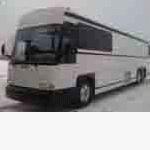 Rating: N/A |
I have a number of customers that have gone to the on demand hot water heaters. Some of them love them but some have not been as happy. If the unit is mounted in the far side of the house, it takes a fair amount of time for the water to get hot after turning on the tap. ODWH are subject to corrosion depending on the quality of the water going through them. Hard water will cause them to lose efficiency due to scale build up. Do they save energy? you bet they do but they have to be working properly | ||
| Sean Shanks (Outsider)
Registered Member Username: Outsider Post Number: 3 Registered: 5-2011 Posted From: 209.188.61.162  Rating: N/A |
Jack, Do you have a tankless heater on your bus? I'd like to see pics if you do. We are currently looking at that option for our bus. -Sean | ||
| les marston (Les_marston)
Registered Member Username: Les_marston Post Number: 481 Registered: 1-2010 Posted From: 68.151.225.213  Rating: N/A |
If you do, a suggestion might be to incorporate it with a hydronic furnace that can heat the inside of the coach, the engine and the domestic hot water. | ||
| Sean Shanks (Outsider)
Registered Member Username: Outsider Post Number: 5 Registered: 5-2011 Posted From: 209.188.61.162  Rating: N/A |
Les - Spot on. We currently have a webasto heater on the bus and I am hoping to be able to use that to supplement hot water when needed and possibly use as a backup water heater as well. Still trying to figure out the best way to do that. | ||
| les marston (Les_marston)
Registered Member Username: Les_marston Post Number: 483 Registered: 1-2010 Posted From: 68.151.225.213  Rating: N/A |
you may have the ability to do a simple heat exchange from the Webasto/ glycol to domestic hot water. Our Webasto was not worth fixing so I pulled it out and replaced it with an Esper system. It works well and is economical enough that I can heat the storage bays when going down the road. Keeps the domestic water from freezing and the floor warmer. | ||
| George M. Todd (George_todd)
Registered Member Username: George_todd Post Number: 1321 Registered: 8-2006 Posted From: 76.94.209.14 Rating: N/A |
Jack, There are several things left out of that article, which was written by a Realtor, not an engineer, or a plumbing and heating contractor. I am a licensed heating and air conditioning contractor, and have installed at least 20 tankless water heaters in houses and commercial buildings. The price of $1500.00 installed is way low, the true wholesale price of a 199,000 BTU tankless is over $1200.00 before tax. A 199,000 is essentially the smallest size that will do multiple demands at the same time. The comment about 3/4" pipe requirement is not correct either, and totally ignores the Uniform Plumbing Code's requirements for pipe sizing. If you look at it, you will see that you can't get 199,000 BTU thru very much 3/4" pipe. A tankless will require much larger pipe all the way to a house, and thru it from the street. I realize it doesn't take any qualifications to post comments, but the last comment about going from a $1000.00 yearly bill for oil water heat to $80.00 for a natural gas tankless is ridiculous! Home heating oil has 144,000 BTU per gallon, and oil water heaters are 70-80% efficient. At $3.00 per gallon, (no road tax on home heating oil) that would indicate a consumption of 333 gallons. At 75% efficiency, that's 36,000,000 BTU. They sell natural gas by the therm, which is 100,000 BTU, and costs about a dollar. So $80.00 of natural gas at 80% efficient is 6,400,000 BTU, FOR A DIFFERENCE OF 30,000,000 BTU which just can't be standby loss. So, that poster made a HUGE mistake somewhere! Now, you put one of these things in a bus, and you will have to have a propane delivery system capable of supplying 200,000 BTU to the tankless, in addition to the rest of the system. A half full 25 pound tank with 200,000 BTU demand on it will freeze and stop providing enough pressure to operate the regulator in minutes... So, you need at least a 50 gallon DOT tank to run one of them in a bus, and we haven't gotten to venting one! Just somethings to think about... G | ||
| Brandon M (Brandon314159)
Registered Member Username: Brandon314159 Post Number: 75 Registered: 3-2011 Posted From: 71.193.166.23 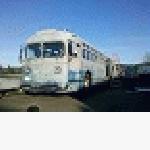 Rating: N/A |
George is basically outlining exactly what I found when I was thinking about tankless. Picked up an almost new Atwood DSI big waterheater and love it. Freezing down regulators and propane tanks is not my idea of a hot shower. Thanks for the info George! | ||
| Jack Fids (Jack_fids)
Registered Member Username: Jack_fids Post Number: 1037 Registered: 1-2009 Posted From: 72.211.145.15  Rating: N/A |
Sean... sorry no pics & none possible at this time. I haven't hooked it up to the cooling system either... but it is under consideration, about 19 burners back from presently started projects ! GMT.... I'm pretty much of the same mind as your observations, the one thing that sold me on my good decision to buy came after the install.... My wife was a card carrying member of the Hotel Shower Hog Assn. a 20 min. shower was dur rigor & a 45 min one was fairly common. Me, I'm in & out in 10 or less & I still "sea-shower". We ran that shower & a single burner "stove" using a single 30 lb cylinder for over a year & it lasted a month almost to the day before refill during the whole year .... and she never once lacked instant hot water, could have had steam if she'd have wanted it ! Yes it's pricey but I've never spent a dime in repairs & maintenance is about 5 mins a year... stainless guts . It will out live me . I just never saw the need to heat water over & over or to buy a HWH only to toss it in 5-10 years , remember I am CHEAP, I drive a 50 yr old truck & a 49 yr old car . (I'd have used an exclamation point there but MY PC just ran out of exclamation point fluid... too cheap to buy a digital compewder too .) | ||
| john w. roan (Chessie4905)
Registered Member Username: Chessie4905 Post Number: 2262 Registered: 10-2003 Posted From: 71.58.71.157  Rating: N/A |
They are great till you have problems out in nowhere. I prefer hwh; simple, CHEAP, and reliable.Oh, did I mention cheap? Too many other finiky systems on motorhomes to deal with to add another one. BTDT on too many things like this over the years. Only my opinion though. | ||
| George M. Todd (George_todd)
Registered Member Username: George_todd Post Number: 1323 Registered: 8-2006 Posted From: 76.94.209.14 Rating: N/A |
A few more thoughts: 1. ODWH require CONTINUOUS 120 Volt AC for their ignition and controls. Less than an amp of 120, which is 7 or 8 Amps of 12V, but the point is that they will keep an inverter running instead of idling, which will get into your boondocking time unless you have solar panels or some other method of recharge. 2. A 100,000 BTU tankless will work well on a bus where you are using a flow restricting shower, and on a short run of propane, it will work on 1/2" pipe. 3. Just some more common facts, and a little more math... A BTU is the amount of heat required to raise the temperature of a pound of water a degree. Water weighs 8 1/2 pounds per gallon, so it takes 8 1/2 BTU to raise the temperature of a gallon of water ONE degree, or 638 BTU to raise a gallon of water from 50 degrees to 125 degrees. If a shower uses 3 Gallons of HOT water per minute, mixed with some COLD, and lasts 20 minutes, it will consume 38,280 BTU. 30 days of that shower only, and no other use will consume 1,148,400 BTU. Propane weighs about 4 1/4 pounds per gallon, so a 30 pound cylinder holds about 7 1/2 gallons. A gallon of propane has 94,600 BTU of heat, and an ODWH is 80% efficient, so 1,148,400/75,680=15.1 gallons per month, or a refill every 14 days? Thats before the second short shower, the stove, and the fact that in the wintertime the incoming water will be below 50 degrees, and require more heat. Maybe its a 30 GALLON tank, not a 30 POUND tank? A standard ODWH cannot take in warm water as in a solar backup system, an engine/generator loop, or a hydronic heating system. An upgrade to a solar model ODWH is required. $ This is just propane tank sizing 101 for bus conversions. G | ||
| joe padberg (Joemc7ab)
Registered Member Username: Joemc7ab Post Number: 629 Registered: 6-2004 Posted From: 66.38.159.33 Rating: N/A |
George Can you elaborate why a standard ODWH cannot be used for a hydronic heating system ? I thought that as long as waterflow is present to activate the unit it will turn on the burner and produce hot water. In a heating loop it would offcourse be the circulating pump that starts the flow. Joe. | ||
| George M. Todd (George_todd)
Registered Member Username: George_todd Post Number: 1324 Registered: 8-2006 Posted From: 76.94.211.60 Rating: N/A |
Joe, A standard ODWH will boil incoming warm water, and trip its over temperature protection. The solar versions have a special modulating control on them which will turn the burner down real low to cope with warm inlet water. You have to remember the size of the heat exchanger in a tankless versus a conventional, then the burner size of a tankless in relation to a conventional. The heat exchanger in a tankless is less than a fourth the size of the one in a tank, and the input rate can easily be five times as much, so flow and input temperature are critical. Rinnai Brand used to make a residential and a commercial model, and they wouldn't warranty the residential model if it did any hydronic heating. As that was the main reason I wanted the big output, I only bought the commercial model. Now, they only make one model which does everything. I'm a proponent of hydronic heating, especially in buses, because all the needs can be combined in one system. The engine or the generator will provide free space heating, and domestic water heating, when either of them are running, and you arrive with with a tank of free hot water. With a heat source of size, it will heat the bus and the domestic water while standing, AND heat the block quickly for a cold start. Now, all of this is done with antifreeze, and only one heat exchanger to do the domestic raw water. Because of the high heat exchange rate in a tankless, they don't do well on glycol, and of course the burner and heat exchanger have to be exposed to outside air to work. Most of the tankless have freeze protection built in, at about 40 f, they will come on in low fire and keep themselves warm by going on and off. But, as I said above, they require continuous 120 VAC for their controls, so no power means no freeze protection. I guess you could buy one of the concentric vented indoor models, install it in an insulated bay, and vent it thru the roof. That way there wouldn't be any outdoor air circulation around it and it wouldn't freeze in a few minutes with no power. With a heat exchanger and two circulating pumps, you could heat your bus and your block, but a Webasto or one of the other brands of diesel heaters ends up being about the same cost, a whole lot less complicated, a whole lot more dependable, and you only have to carry enough propane for your stove and your fridge! DON'T EVEN THINK OF PUTTING AN OUTDOOR STYLE TANKLESS IN A BAY AND VENTING IT OUT THE SIDE!!!! I'm sorry to use you for the example, but this site is for LIVE Bus Nuts! G | ||
| FAST FRED (Fast_fred)
Registered Member Username: Fast_fred Post Number: 1671 Registered: 10-2006 Posted From: 67.238.59.158  Rating: N/A |
The other huge problem with tankless in a bus camper is the requirement for constant water flow in order to have hot water. Try taking a shower , and saving water , by shutting off the spray head. Hot , cold , hot, cold SUCKS! FF | ||
| Tim Hoskinson (Tdh37514151)
Registered Member Username: Tdh37514151 Post Number: 271 Registered: 9-2004 Posted From: 75.180.10.87 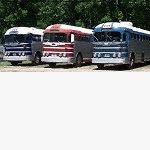 Rating: N/A |
Fred hit that one right on the nose. We tried one for a short time but because most of our camping is done with no shore power or water hook ups we found our selves wasting more water due to jumping in and out of water that was quickly to hot or to cold. By the time you got the water temp. adjusted for comfort you wasted much more water than the old tank did. A family of four taking showers for four days at a time between fill ups must make utilities last. We found that the tank worked best for us. I'm sure others with different camping methods would have different results. Tim | ||
| Sean Welsh (Sean)
Registered Member Username: Sean Post Number: 1300 Registered: 1-2003 Posted From: 67.45.240.154 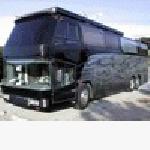 Rating: N/A |
We just had a similar discussion to this over on the other board, and I will repeat here what I said there: The "energy savings" of an ODWH, in an RV, could well be zero and more likely will be *negative*, by which I mean an ODWH will use more money/energy in a typical RV than a standard model with a tank. About the only time an ODWH can save you money in an RV is if you are in a full hookup campground where you are paying for electricity by the watt as a separate charge. If you boondock a lot, and/or stay in campgrounds where electricity is included in the site rental, than an electric tank model will save you tons of money, and an electric model with a hydronic heat exchanger in it can give you even more savings and flexibility. The reason is simple: A gas- or oil-fired ODWH uses fuel each and every time you need hot water, so you will pay full price for every BTU of heat you get. By contrast, an electric model with a tank can make "free" hot water from shore power if that's included in your site, even from a relatively small shore service such as 30- or 20-amp (an electric ODWH requires a much larger service). If you boondock or "dry camp" a lot, you will most likely need to run your generator at least briefly each day to charge batteries. While electricity from the generator used to heat water is not "free," it's cheap, because the incremental fuel used for the additional 1-1.5kW of load is very small, and might even be negligible if the set is operating down around half load or so. You'll also be doing the genset a favor by adding load to it. Moreover, if you have a heat-exchanger style water heater, you can heat the water for free with the waste heat from the generator. And you'll get plenty of free hot water when you drive, too. The bottom line is that the energy calculus of residential water heaters can not necessarily be applied to coaches. As a final comment, I would also suggest to anyone who stays in anything other than "full hookup" campgrounds (by which I mean there is a sewer connection at your site), that having "unlimited" hot water is a snare and a delusion, because you will not also have unlimited waste capacity, even if you have an unlimited water supply. So having only, say, 12-20 gallons of hot water on board at a time is not necessarily a limitation or a bad thing. A 12-gallon hydronic water heater, starting from 165° (typical Webasto/Espar coolant temperature -- engine coolant would be even higher, say around 175°), ought to be able to serve up showers for 4-6 people in a row under boondocking conditions. If it doesn't, you're going to have bigger problems than heating water. FWIW. -Sean http://OurOdyssey.BlogSpot.com | ||
| joe padberg (Joemc7ab)
Registered Member Username: Joemc7ab Post Number: 632 Registered: 6-2004 Posted From: 66.38.159.33 Rating: N/A |
Thanks George and Sean for the enlightening details. As a choice for fuel there is little differnce in cost, because the BTU ratio is virtually identical to what we are paing locally for diesel and propane, 121 dsl and 80 cents /Ltr prop 1.51x So what it boils down to is you are paying for BTU's and the liquid variety (dsl) are a lot easier to handle. | ||
| R.C.Bishop (Chuckllb)
Registered Member Username: Chuckllb Post Number: 1697 Registered: 7-2006 Posted From: 97.213.116.95  Rating: N/A |
SEAN says....."Moreover, if you have a heat-exchanger style water heater, you can heat the water for free with the waste heat from the generator. And you'll get plenty of free hot water when you drive, too." I do have a "heat-exchanger style water heater"... it is only effective when the coolant is heated....as in Webasto or engine running. What am I missing here?.....if the coolant system is not part of the generator system, then, how can one "heat" water?.....unless, of course the water heater switch is turned on. I am all "ears".  RCB | ||
| Sean Welsh (Sean)
Registered Member Username: Sean Post Number: 1301 Registered: 1-2003 Posted From: 67.45.240.154  Rating: N/A |
Chuck, Sorry, should have been more specific and/or detailed: The only way to use free waste heat from the generator to heat domestic water (and/or the bus itself) is to have the genny cooling system tied in to the hydronic loop. Generally this is done with a heat exchanger, so you would merely have to run your hydronic pump while the genset is running. That said, there's not all that much waste heat from this, as compared to, for example, the waste heat from a two-stroke Detroit prime mover. We found it was not worth the added expense, since we have plenty of extra capacity from the genny for making hot water (or domestic heat) electrically. We do, however, have the main engine cooling tied into the hydronic system with a heat exchanger, so we get all the heat and hot water we can handle for free whenever we are driving. -Sean http://OurOdyssey.BlogSpot.com | ||
| FAST FRED (Fast_fred)
Registered Member Username: Fast_fred Post Number: 1673 Registered: 10-2006 Posted From: 67.238.59.158  Rating: N/A |
Even if its not in some cooling loop a marine HW unit has a huge advantage. Most have an over heat protection set up, should the unit be plugged in while there is no water in the unit a simple push button reset saves the day. FF | ||
| R.C.Bishop (Chuckllb)
Registered Member Username: Chuckllb Post Number: 1699 Registered: 7-2006 Posted From: 97.225.231.23  Rating: N/A |
"The only way to use free waste heat from the generator to heat domestic water (and/or the bus itself) is to have the genny cooling system tied in to the hydronic loop." ...and then ONLY IF one has a radiator cooled generator set up right? Many (including myself) do not have such an animal. We rely on Webasto or engine while "on the road". Fred you are 100% correcto...HUGE BTDT  RCB | ||
| Sean Welsh (Sean)
Registered Member Username: Sean Post Number: 1304 Registered: 1-2003 Posted From: 67.45.240.154  Rating: N/A |
Chuck, if you have a generator it almost certainly has a cooling system which connects to a radiator someplace, so I'm not sure what you mean when you say that many do not have such an animal. Unless you mean that you don't have a generator at all? -Sean http://OurOdyssey.BlogSpot.com | ||
| Bruce Henderson (Oonrahnjay)
Registered Member Username: Oonrahnjay Post Number: 726 Registered: 8-2004 Posted From: 69.143.49.201 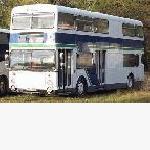 Rating: N/A |
"Unless you mean that you don't have a generator at all?" Or someone has an air-cooled generator. | ||
| Sean Welsh (Sean)
Registered Member Username: Sean Post Number: 1306 Registered: 1-2003 Posted From: 67.45.240.154  Rating: N/A |
Ahh, right. I tend not to think in air-cooled sizes, which, in RV diesel sets, tops out around 3,500 watts. (Lots of air-cooled contractor-type sets go to 6kW, and there are some gas/lp RV models that are air cooled up to 6k as well). Thanks for correcting me. Doh. -Sean http://OurOdyssey.BlogSpot.com | ||
| R.C.Bishop (Chuckllb)
Registered Member Username: Chuckllb Post Number: 1700 Registered: 7-2006 Posted From: 97.212.104.91  Rating: N/A |
Sean....perhaps I don't understand.....my unit, as others have I am quite sure, is an Onan 6.5, gas and not "contractor type"...many, many, many of them out there...and not necessarily RV. This unit came from a US Govt. facility, not an RV...stationary. Fine "animal".  It is, indeed, air cooled. RCB | ||
| Sean Welsh (Sean)
Registered Member Username: Sean Post Number: 1308 Registered: 1-2003 Posted From: 67.45.240.154  Rating: N/A |
As I said, there are gas units, but few RV diesels are air-cooled over 3.5k. Stationary generators not listed for RV use can not legally be installed in an RV or conversion. Free-standing contractor-type units, of course, are common, but they must be operated outside of the RV. -Sean http://OurOdyssey.BlogSpot.com | ||
| R.C.Bishop (Chuckllb)
Registered Member Username: Chuckllb Post Number: 1701 Registered: 7-2006 Posted From: 97.212.104.91  Rating: N/A |
As usual, SEAN...you will have the last word, but I assure you, you are off mark on what I have said. I yield....not worth it.  RCB | ||
| Austin Scott Davis (Zimtok)
Registered Member Username: Zimtok Post Number: 492 Registered: 9-2006 Posted From: 173.166.209.1  Rating: N/A |
Every time I hear/read about instant hot water devices I think of this "life adventure" I had... About 15 years ago I did a machine install in Malaysia and I stayed at a little motel just outside of Kuantan. It was little more then a group of huts in a clearing. There was no piped in hot water. The shower had a shower head that heated the water as it came through. It had a power cord that went from the shower head over to a wall outlet just outside the shower area. The slower the water flow the hotter the water was coming out.It was almost a trickle before it was as hot as I liked it. So for a week I took cool/cold showers... . | ||
| Sean Welsh (Sean)
Registered Member Username: Sean Post Number: 1310 Registered: 1-2003 Posted From: 67.45.240.154  Rating: N/A |
Chuck, I am sorry if I came across as being argumentative; that was not my intent. I overlooked air cooled units and I do know that many folks here have them. The rest of that post was just my mind wandering through the panoply of possibilities, for the benefit of other readers. -Sean | ||
| Jack Fids (Jack_fids)
Registered Member Username: Jack_fids Post Number: 1039 Registered: 1-2009 Posted From: 72.211.145.15  Rating: N/A |
"A few more thoughts: 1. ODWH require CONTINUOUS 120 Volt AC for their ignition and controls." My Bosch LP unit has NO ELECTRICAL hook-up whatsoever... except for the Pizo sparker\igniter which is manual . FWIW and as for adjusting the temp at the showerhead, we balanced our temp at the thermostat for 120 deg water so that the addition of "Cold" wouldn't be necessary . | ||
| Tom Christman (Tchristman)
Registered Member Username: Tchristman Post Number: 359 Registered: 1-2006 Posted From: 166.250.65.222 Rating: N/A |
10gal electric water heater at Home Depot or Loews-$259.00. How much is the on demand? Good Luck, TomC |